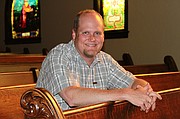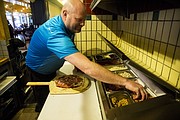Giving workers a helping hand
COEUR d’ALENE — A new Coeur d’Alene nonprofit hopes to fill a need in the community by serving those who serve.
CDAide will connect employees in the local hospitality industry to services ranging from emergency financial assistance to medical care to counseling.
Board member Jeff Messinger, the manager at Tito’s Italian Grill, said these employees often scratch and claw to survive paycheck to paycheck, and he hopes CDAide can alleviate some of that stress.
“I’m giving $20 to a dishwasher, and he is almost crying because that’s what going to get him through the next five days,” Messinger said.
He added that many of the employees who customers might never see — cooks, dishwashers and maids — often suffer the most and encouraged people to keep that in mind.
“Go back there [to the kitchen] and say, ‘Who cooked my meal? That was fantastic, here’s $5,’” Messinger said. “Who’s doing your dishes? Who’s making your bed?”
The organization’s roots formed about a year ago when First Presbyterian Church, at Sixth and Lakeside, began to explore how it could best help its downtown neighbors and determined that workers in the food and lodging industries were at the greatest need.
“It’s hard to make ends meet, there are long, odd hours, and you always have to be ‘on’ for the customers even though they often don’t treat their servers with much kindness,” Rev. Craig Sumey told The Press. “Financial margins are thin, so sometimes a crisis — car breaking down, unexpected medical bill, pregnancy — can turn into a catastrophe really fast, with few places to turn for care and help.”
Eventually, Sumey said, the church realized it couldn’t meet all these demands on its own. At that point, others in the community were called upon to continue the work, and CDAide was born.
Board chair Rebecca Smith — who also works as an instructor at Gonzaga — was introduced to the market of serving hospitality workers about five years ago when she met the executive director of Big Table, a similar nonprofit based in Spokane.
Though Smith has vast experience in nonprofit work, she said CDAide was a unique organization.
“I’d never heard before of a group that focused on people who work in the hospitality industry, but it made so much sense to me as a very hardworking sector of our community that nonetheless has a lot of significant needs that go unmet,” Smith said.
For Messinger, the chance to help out hospitality employees almost felt like an obligation.
“The opportunity to help people who are going through the same struggles that I’ve already gone through myself is exciting to me,” Messinger said, “and almost my calling or duty.”
Messinger said he has worked in the food industry in Coeur d’Alene for three decades, so he understands what difficulties these workers face.
“There are just small $500 to $800 things that can happen to young people in this industry that can make the bottom fall out of their whole lives, that can take them from financially secure to almost homeless,” Messinger said.
First Presbyterian has provided CDAide with some startup and ongoing funding, but from this point forward, the nonprofit will rely primarily on donations and volunteers.
This Wednesday, Feb. 7, the organization will host its first official fundraiser and introduction to the community, beginning with a free reception and silent auction open to the public at 6 p.m. at Taphouse Unchained at 210 Sherman Ave.
At 7:30 p.m., there will be a dinner at Tito’s Italian Grill only for those interested in donating their time, money or services.
Smith said volunteers willing to lend their time and talent are just as valuable as any monetary donations.
“We’re small now, so part of this event is not just hoping to get dollars, but also to get people,” Smith said. “I would say that’s even more important — to get the right people to invest in this project.”
She emphasized that CDAide is a relationship-based organization that is looking especially for care partners in the community.
“This could be an auto mechanic, or a dentist, who’s willing to offer a limited number of services to people in the [hospitality] industry in need during the year,” Smith said.
Although the nonprofit does have a faith-based element, Smith said that CDAide hopes to work with all types of people and organizations, whether secular or faith-based.
“That’s an important part of our mission, too, is to build those bridges,” Smith said. “Sometimes the faith community can be set apart from other sectors of the community, but I think we can be more powerful working together.”
Additionally, she noted that no hospitality employees will be denied assistance because of religious reasons, nor will they be forced to do anything other than show a genuine need in order to receive benefits.
“Our mission is to serve other people as a reflection of our faith — with no strings attached, with no expectations of them, but just as a statement of service to them,” Smith said.
While service workers cannot suggest themselves to CDAide for assistance, their managers, owners and coworkers may refer those in need. This can be done by sending an email to serving@cdaide.org and filling out the referral form electronically.
Smith said the organization will provide a limited number of financial benefits per individual — no specific number has been determined yet — in the hopes of providing a connection instead of just a check.
“It’s more an extension of help that is the start of a relationship to connect them with other resources and figure out what their deeper needs are,” Smith said.
That being said, Messinger noted that only in extreme cases will an individual be turned away.
“Unless you are completely out of bounds and it’s an obvious sham, then you are going to be helped with no strings attached,” Messinger said.
Messinger said people should get involved because the service sector touches everyone.
“It is the fabric of our lives, the hospitality industry,” Messinger said. “Even if you don’t work in it, you’re going there to either celebrate or get through your day.”
According to Sam Wolkenhauer at the Idaho Department of Labor, there were 5,400 food service employees and 1,517 accommodation workers in Coeur d’Alene in 2016.
The median hourly wages for these positions ranged from $8.76 for waiters and dishwashers to $16.85 for chefs and head cooks.
The median figures for other hospitality positions were as follows: $9 for bartenders, $9.17 for hotel and resort clerks, $9.23 for maids and housekeeping, $9.25 for hosts and hostesses, $9.63 for food prep workers, and $10.99 for restaurant cooks.
More than money, though, Messinger said the best thing people can do to help workers in the hospitality industry is to treat them with dignity.
“Relaying kindness and value to human beings,” he said, “is a huge service that the world needs so much more than dollars.”





